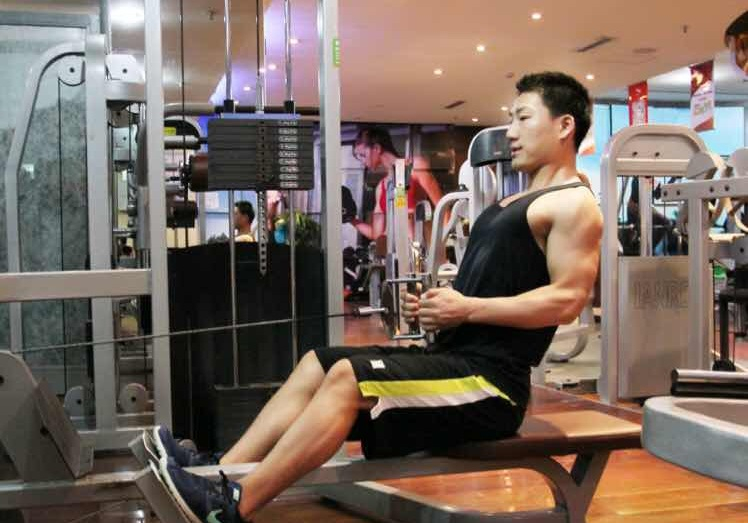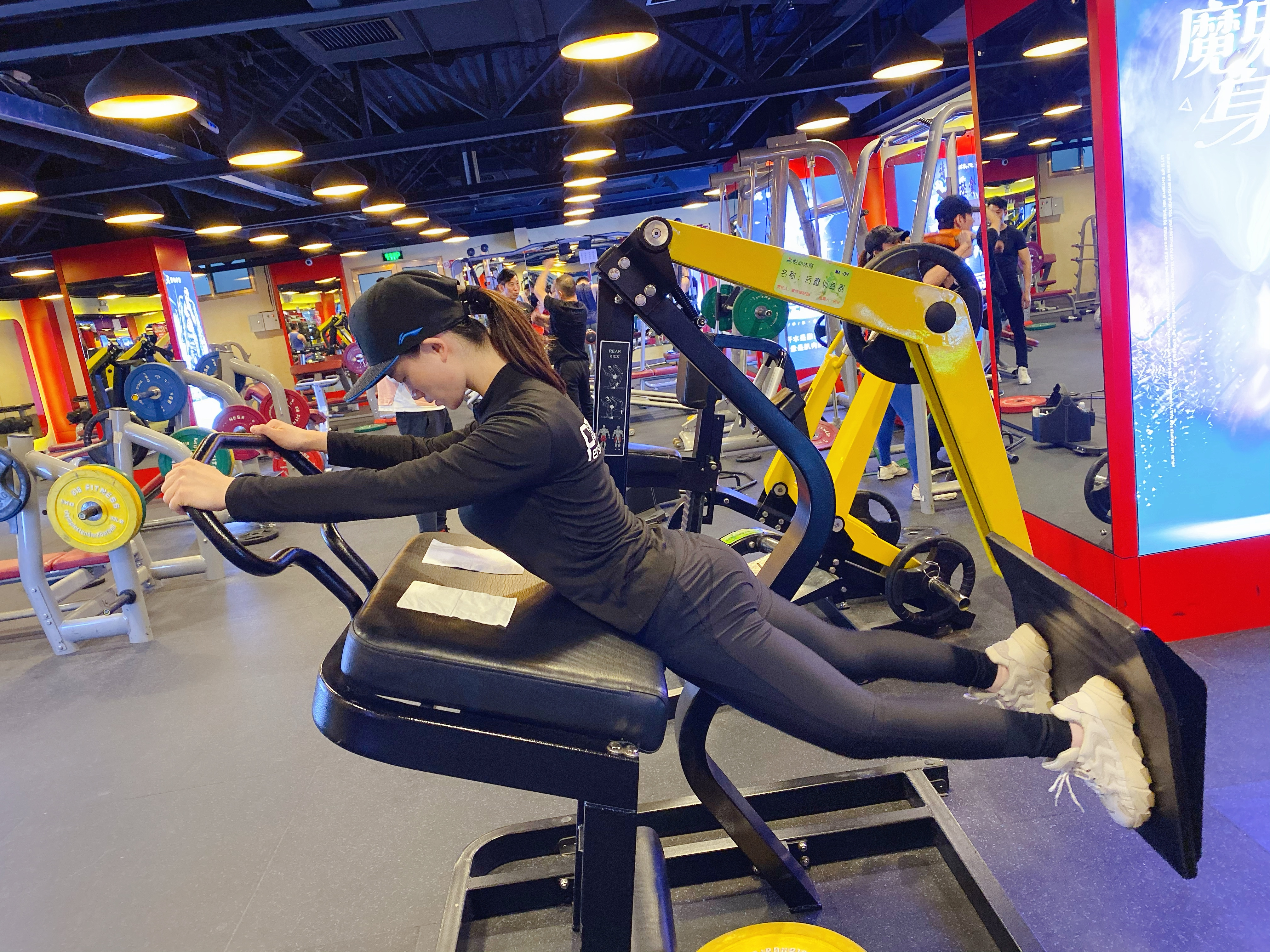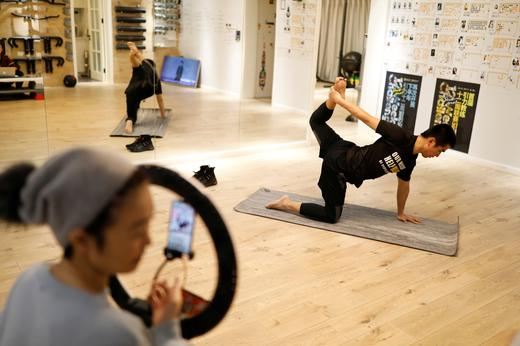This is the fifth episode of our series "Faces Fighting Coronavirus" chronicling people from different walks of life who are affected by the outbreak as well as those who are trying to keep their lives as normal as they can to keep our society running. Here you can find the first, the second, the third, and the fourth stories.
Our fifth episode details the lives of three fitness trainers as they tried to revive their fitness business in the aftermath of coronavirus outbreak.
Guo Yi, the 32-year-old founder of a fitness studio in Beijing, managed to stay calm amid the coronavirus outbreak, though his business has been completely shut down.
His studio, Warm Fitness, located in Beijing's central business district, has remained closed since January 21 when he left Beijing for the Chinese New Year celebration. His original plan was to resume operation on January 31, but the coronavirus outbreak pushed back his plan indefinitely.
As people are advised to stay indoors and avoid crowds, most gyms across the country have stayed closed. Though Guo's business is not back to normal, he still has to pay rent, an exorbitant amount of money considering the studio's prime location in the Chinese capital city.

Guo in the middle of an upper body workout in his studio in Beijing, China. /Photo courtesy of Guo Yi
Guo in the middle of an upper body workout in his studio in Beijing, China. /Photo courtesy of Guo Yi
Months after the Chinese New Year are considered the golden time for the fitness industry. After Spring Festival weight gain, many take on a fitness class or two to lose the weight they put on during the holidays. For Guo, the three months business from March to May usually account for 30 percent of his annual revenue, but now he risks losing it all.
"I called my landlord yesterday trying to ask for a rent waiver, but my request was denied," he said. In the end, he got a one-month extension, a temporary measure.
Around him, fitness studios affected by the coronavirus outbreak are trying out new forms of business, such as launching pre-recorded online classes or live streaming fitness sessions. Keep, the fitness app that is backed by GGV Capital and Tencent, soared in total downloads in the fitness category in China's app store following the coronavirus outbreak, as users rushed to download the app to stay active while they're mostly indoors.
Yuedong sports, one of the largest sports chain stores in China, is among the few which joined the live streaming craze. Shortly after announcement came that the Lunar New Year holiday would be extended, Wang Lin, a fitness instructor at Yuedong, held meetings with her colleagues to discuss the possibility of live streaming workout sessions on the short video app Douyin.

Wang Lin, a fitness instructor, shows to her students how to do leg workout in at Yuedong sports store in Beijing, China. /Photo courtesy of Wang Lin
Wang Lin, a fitness instructor, shows to her students how to do leg workout in at Yuedong sports store in Beijing, China. /Photo courtesy of Wang Lin
On February 14, Valentine's Day, they started streaming their first workout. Their large membership base quickly turned into clicks in the live streaming forums. The first time that Wang offered an online cardio class, she noticed that at least a few hundred were watching her live stream and posted comments of their workout experience.
"The payment we get from doing live streaming class is minimal. The goal is really to promote the brand so that when we re-open the gym some day, the online boom can turn to offline revenue," she said.
But not every gym can move online to revive its business. Zha Zha, a trainer at a rock-climbing gym in northern Beijing, said the gym had to reopen in order to keep the business functioning, since it is almost impossible to do rock climbing at home.
Despite offering heavy discounts and conducting routine on-site disinfection, the gym lost a huge number of daily customers shortly after it reopened. In two days, the number of its daily customer dropped to only one fifth of an average-day figure before the coronavirus outbreak.

Zha Zha at the rock climbing gym he works for in Beijing, China. /Photo courtesy of Zha Zha
Zha Zha at the rock climbing gym he works for in Beijing, China. /Photo courtesy of Zha Zha
The business's monthly income is expected to decline from over 200,000 yuan (28,600 U.S. dollars) to about 30,000 yuan (4,290 U.S. dollars), according to Zha, while the monthly rent for the venue has remained at 80,000 yuan (11,400 U.S. dollars). If the situation does not improve any time soon, the gym may be on the verge of closing down, he added.
The management team at the gym has applied for rent exemption, a policy rolled out by the Beijing government earlier this month, among a series of measures to help small and medium-sized enterprises through the hard time. But the implementation of the policy takes time.
In an article published on its WeChat official account last week, the rock-climbing gym admitted that the coronavirus has dealt a huge blow to the five-year-old gym and it is going to try out measures to save itself from closing. Atop its strategies is offering free face masks to a small number of customers who purchase private coaching sessions at the gym.
In order to contain the spread of the virus, the creative industrial park, where the gym is located, now requires identity and health checks for anyone entering the park. That means customers will need to contact the gym for registration one day in advance to get a pass for the next day.

A trainer teaches a class that is being live streamed at a gym. /Reuters
A trainer teaches a class that is being live streamed at a gym. /Reuters
Zha said the inconvenience could be a factor in the decline in customers. Not to mention that most people are staying in, for fear that going out will expose them to infection.
Expecting a similar dampening effect on business, Guo, the owner of the fitness studio in Beijing, decided to deal with his business one step at a time. He said once he is able to re-open his studio, he is going to limit classes strictly to one-on-one sessions so that there would be no more than two people at the studio at the same time to prevent cross-infection.
Unlike many who are anxious about their business not able to be back to its maximum capacity, Guo said he is comfortable with starting slow. For a small fitness studio like his, maintaining a stable membership of around 100 people is good enough for a sustainable cash flow.
"I don't see any point in being anxious. What good can it bring?" he asked. "At this point, to keep the gym close is to stay accountable. Even if I want to resume the business, I cannot put my customers' lives at risk."